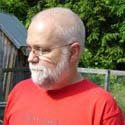This afternoon when we were actually speaking face to face, I suggested the notion that maybe "there is no teaching, only learning"--I love pithy little apothegms like this, but I suspect, alas, that it is wrong. "What am I actually doing when I'm standing in front of a class," I asked. I don't think we ever got around to answering this question because you asked, "What am I doing when I am speaking to a baby who cannot understand the meaning of my words?" "You are teaching," said I. "What is the difference between language -learning & language acquisition," you asked? We didn't answer that one either, just nodded sagely in each others' direction. But I want to go back to my question about teaching. Wittgenstein begins the Philosophical Investigations with a parable about teaching, though his attitude toward the story from St. Augustine only emerges slowly over the course of the first dozen or so remarks. Wittgenstein himself was a teacher--a university professor revered by those students tough enough to subject themselves to his therapeutic method; he also taught what we would call elementary school for several years during a period of his life when he was engaged in severe self-reflection & trying to be of some practical use in the world. (Am I remembering the Ray Monk biography correctly? He became a schoolteacher between the First & Second World Wars--after he had published the Tractatus (and become disillusioned with it?)).
When I posed the question, "What am I doing when I stand in front of a classroom full of students?" I was in a phenomenological frame of mind. I wanted to get at the actual texture of the experience. So: standing there, I am saying words that refer the students to concepts they 1) are already conversant with, 2) have encountered in their reading for the course, or 3) are just being introduced to; I do not lecture from notes, so I am making connections on the fly; I am often engaged in asking questions that will A) enable my students to make connections on their own & B) lead them beyond my questions & discourse (these are what I would call poetic questions, leaping questions); I am also able, given current technology, to present my students with images that illustrate the concepts with which we are dealing.
I had the opportunity last Thursday to become a student in one of my own classes: My colleague Sarah Melville came to my Imagining Science course to talk about Ancient Science. She is an expert in ancient Near Eastern languages & culture: I invited her because I wanted to my students to have a sense of where their own scientific traditions originated. Sarah used the same technology as I do, but projected mostly words on the screen in front of the class. She used only a few images. When I teach the same course I use mostly images & weave a text around them. I don't offer this as criticism, only description. One might think that a poet, which I claim to be, would be more enamored of words.
Take the previous two paragraphs as description. What kind of analysis can we make? The first thing that comes to mind is that when I am standing in front of a classroom full of students, I am making connections--both for myself & (I hope) for the students. (More description: There is an element of performance--occasionally I remark to myself, this is going really well, sometimes, this is in the fucking tank.) Anyway, after this interrogation of myself in the classroom, I conclude that what I am doing is , at its most primitive, W's "ostensive teaching"; but most of what is going on is a negotiation among various possible positions, some presented by me as teacher, some presented by the students as students. But do you see how easily these roles turn inside out & become the other. I am often the student, exclaiming, "Yes, I didn't see that before." The students, in this situation, are free to become teachers. I have been instructed by many of my students over the years--I have even endured the occasional pedantic lecture from same!
To return to the beginning: there is both teaching & learning, but they exist in a complex & simultaneous dance. (In the foregoing, I have stepped back to discuss teaching-in-general. Does this shed any light on the teaching-of-language? Learning of language? I am prepared to accept the conclusion that it does not.)
Philosophical Investigations
Christopher Robinson & Joseph Duemer read Wittgenstein's Philosophical Investigations


0 Comments:
Post a Comment
<< Home